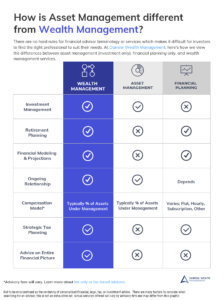Looking to find fiduciary financial advisors and wealth managers? Only fiduciary advisors are legally bound to act in your best interest at all times. Here are five ways you can find a full-time fiduciary financial advisor.
What is a fiduciary advisor?
A fiduciary advisor is a financial professional who is legally obligated to act in the best interest of their clients. A fiduciary must always prioritize their clients’ needs above their own interests and mitigate or disclose any conflicts of interest that may arise.
Not all advisors are fiduciaries. Stockbrokers, registered representatives, dual registered advisors, insurance agents, and other types of advisor-sales roles don’t always have to act in your best interest depending on the situation.
For non-fiduciary financial advisors, recommendations may only need to be suitable, not necessarily in the client’s best interest. Hybrid firms can switch between their status as a registered investment advisor and brokerage, which can be problematic for individuals seeking unbiased financial advice.
Benefits of working with an independent fiduciary advisor
Independence is important when seeking financial advice. Independent wealth management firms have no affiliations or allegiances to a fund family or financial product. Advisors affiliated with a bank, broker dealer, or large asset manager might not be able to make a fully independent recommendation.
Consider this: you walk into a Bank of America branch and ask for the best type of savings account on the market. Would you expect them to suggest one of their accounts or tell you to go online and open a high-yield savings account with a competitor?
Today, many investment advisors operate as a subsidiary of another larger, parent firm. For example, Merrill Lynch often has affiliations and partnerships with smaller firms or stand-alone advisors and LPL Financial is comprised of a network of advisors backed by the platform.
Affiliated advisors can still call themselves “independent” or a registered investment advisor, but they will still need to disclose the relationship, which is why it is always important to read the disclosures provided, such as the ADV. You can look up the ADV on the SEC’s advisor search website.
Other reasons to work with a fiduciary registered investment advisor
- Legal obligation to act in your best interests: A fiduciary duty isn’t a marketing tactic, it’s a legal obligation and the highest standard of loyalty and care under the law. Only registered investment advisors have a full-time fiduciary duty to their clients. Other types of advisors aren’t required to act in their client’s best interest 100% of the time.
- Less conflicts; more transparency: Fiduciary advisors must try to mitigate the potential conflicts of interest between the advisor and client. If such a situation cannot be avoided, the potential conflict must be disclosed to the client.
- Most fiduciaries don’t sell products: Most fiduciary advisors are only paid by a percentage of assets they manage for clients. This AUM based fee structure is common among fee-only advisors who are almost always full-time fiduciaries. Advisors that receive commissions from selling mutual funds, insurance, annuities, or other products are incentivized to push products, leaving less time for advice.
How to find a fiduciary financial advisor
Here are 5 ways to find a financial planner who will work in your best interests.
- Google search
- CERTIFIED FINANCIAL PLANNER™ website (for certified financial planners)
- NAPFA website
- Ask friends, family, coworkers, or your tax and legal advisor for referrals
- Securities and Exchange Commission advisor search

Google web search for a financial advisor
One of the harder aspects of finding the right financial professionals is knowing what you’re looking for. A Google search for financial advisor near me returns over one billion results. The results can be overwhelming and not especially relevant for you.
But if you’re specifically looking to find fee-only fiduciary investment advisor, you’ve already narrowed your search considerably (a web search for fee-only fiduciary financial advisor near me still returns about 20 million results).
Also consider adding other attributes that are important to you, such as an advisor that specializes in your situation (e.g. business owners selling a company, stock compensation, etc.). With a specific search, Google can be a great starting point to gather a list of potential money managers.
A note of caution on near me searches. For many investors, the most important factor when trying to find a financial advisor is the location and proximity to where they live.
CERTIFIED FINANCIAL PLANNER™ website
The CERTIFIED FINANCIAL PLANNER™ professional designation is typically thought of as the gold standard for financial advisors.
In 2019, the CFP board announced CFP® professionals must adhere to a fiduciary duty when providing investment advice. Of course, what qualifies as personal investment advice is a big factor and another topic, but the CFP board has gone above most if not all other professional organizations in requiring advisors to put their client’s best interest first.
It’s important to note that the CFP Board’s fiduciary standard is business-model neutral as described below. So if you’re looking for a fee-only fiduciary advisor, you will still need to narrow down the results as the board allows fee-only and fee-based advisors.
You can search for CFP® professionals here.
National Association of Personal Financial Advisors (NAPFA)
The National Association of Personal Financial Advisors may come up in some of your searches for an advisor. NAPFA advisors are all fee-only financial advisors. However, if you’re trying to find a fiduciary advisor, you will need to do some extra homework to ensure the professional is also a registered investment advisor.
As previously mentioned, many fee-only advisors are also fiduciaries, but it isn’t a requirement.
NAPFA can be a useful resource for some individuals, particularly investors just starting out, but it’s not going to include all the firms in your search location.
For several reasons, many fee-only fiduciaries (including Darrow Wealth Management) choose not to become members of NAPFA. Therefore, it’s important to search more than one website for a planner.
Asking your other advisors, friends, family, or coworkers for referrals
A personal referral to a fiduciary financial advisor from someone you know can be one of the most effective ways to find an advisor, but it isn’t fool-proof. As discussed, due to the complexity and jargon of the industry, investors don’t always know if their money manager is a fiduciary or how they’re paid.
Personal referrals are especially helpful to get a sense of fees and services. Asking around can be a helpful starting point but consider doing your own research on the planner and firm before engaging.
If you’re working with a CPA for your taxes or have an estate planning attorney, consider asking them for a recommendation also. Those professionals will know your financial situation and should have an existing network that includes fiduciary investment advisors.
SEC advisor search
The Securities and Exchange Commission offers an online search for investors to research registered investment advisory firms or advisors by name. The database is most useful to do due diligence on an advisor, not necessarily to gather a preliminary list of names.
In addition to the SEC, the Financial Industry Regulatory Authority (FINRA) also plays a role in regulating non-fiduciary financial advisors. But before moving forward with a fiduciary investment advisor, consider looking them up for background information, disciplinary actions, etc.
Darrow Wealth Management is proud to be an independent money manager
- A fiduciary financial advisor
- Fee-only wealth manager
- Independent
- SEC-registered investment advisor
- CERTIFIED FINANCIAL PLANNER™ professionals and Chartered Financial Analyst
Schedule a consultation with a wealth advisor today.
[Last reviewed October 2024]









